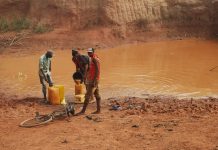Gold, copper, diamonds mining, and other precious metals and gemstones are important resources that are found in rainforests around the world. But it was observed that Extracting these natural resources is frequently a destructive activity that damages the rainforest ecosystem and causes problems for people living nearby
The increasing demand of Gold, Diamond and other natural resources round the world is becoming big threat to natural vegetation, Animals and human being, as most of the forestry are turning to be like a new Sahara places in the continent
Indeed such problems exposes the African natural habitat to Deforestation ,Desertification, extinction of species ,forced migration ,soil erosion, oil depletion ,ozone depletion ,green house increase ,extreme energy, water pollution, natural hazard/natural disaster
The increase demand for natural resources in Africa,is contributing to the explosion of the entire African forestry to desertification,there-by causing a serious extinction of natural vegetation ,and the forces of African animals migrating to other safer places

The exploitation of natural resources is the use of natural resources for economic growth , sometimes with a negative connotation of accompanying environmental degradation . It started to emerge on an industrial in the 19th century as the extraction and processing of raw materials (such as in Mining, steam power , and machinery) developed much further than it had in preindustrial eras. During the 20th century, energy consumption rapidly increased. Today, about 80% of the world’s energy consumption is sustained by the extraction of Fossil fuel, which consists of oil ,coal and Gas .
Another Non-renewable resource that is exploited by humans is subsoil minerals such as precious metals that are mainly used in the production of industrial Commodities. Intensive agriculture is an example of a mode of production that hinders many aspects of the natural environment, for example the degradation of forests in a terrestrial ecosystem and water pollution in an aquatic ecosystem .

As the world population and Economic growth occurs, the depletion of natural resources influenced by the unsustainable extraction of raw materials becomes an increasing concern
Africa is particularly vulnerable to climate change, notes the international panel of climate change. Factors such as dependence on rain-fed agriculture and the impact of warming on the spread of disease reinforce multiple pre-existing stresses. Like AIDS, the threat is already here. The toll is rising. Even more damaging effects will play out over decades.
It is a clear fact that the Increase in the sophistication of technology enabling natural resources to be extracted quickly and efficiently. E.g., in the past, it could take long hours just to cut down one tree only using saws. Due to increased technology, rates of deforestation have greatly increased
Africa’s oil contributes to global warming both when produced and when consumed. Africa’s tropical forests, in contrast, are among the most productive “carbon sinks.” Tropical forests store much more carbon than they produce, storing it in biomass or soil.

The extraction and consumption of resources has an impact on the quality of life and well-being of both current and future generations,This includes oil and gas extraction, mining, fishing and forestry
Dams are also a big threat to rainforests, particularly in the Amazon, the Mekong (Laos and Burma or Myanmar), and Malaysia. Dams disrupt river systems, flood rainforest, displace forest people, and support activities that cause more deforestation
African forestry is in danger, as many forestry has already turned to be a new desert due to constant falling –down of forest tress without planting new once
Most agricultural land has also been affected as a result of mining activities in the region

African climate reporters therefore deem it fit to calls on all African Government to find means of educating miners and farmers,on the importance of planting tress in the region.
Written by
Comrade Nurudden Bello
African Director of African Climate reporters



















